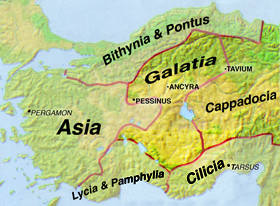Ancyra became the capital of the province and it seems likely to have been the natural place for the address of the letter to the Galatians. In the fifth century Theodoret speaks of Eusebius of Ancyra as him "who wisely rules the Galatians (Letter 52). Must not this have always been the case (i.e. that the church of Ancyra governed the province of Galatia? Yet most significant of all - as we look at the map - is the fact that just north of Ancyra was the province of Pontus, the famous 'home' allegedly of the 'Marcionites.' The association continued into the fifth century when Theodoret mentions 'Ancyra' and Pontic Marcionites in the same breath:
On learning that some of the Nomads encamped along the Danube were thirsty for salvation, but had none to bring them the stream, John sought out men who were filled with a love of labour like that which had distinguished the apostles, and gave them charge of the work. I have myself seen a letter written by him to Leontius, bishop of Ancyra, in which he described the conversion of the Scythians, and begged that fit men for their instruction might be sent. On hearing that in our district some men were infected with the plague of Marcion he wrote to the then bishop charging him to drive out the plague, and proffering him the aid of the imperial edicts. I have said enough to show how, to use the words of the divine apostle, he carried in his heart “the care of all the churches.” (Theodoret Ecclesiastical Histories 5.31)

